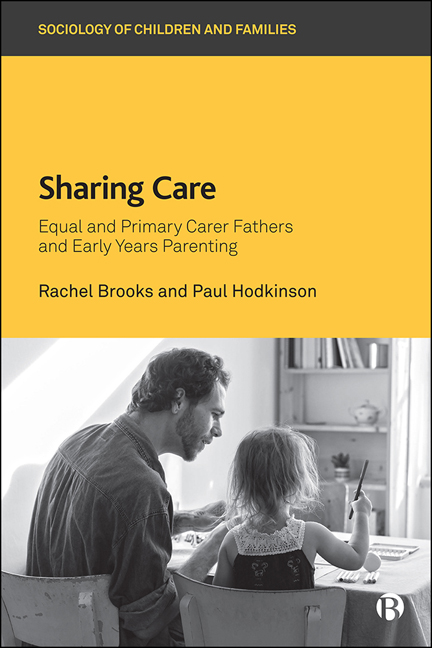Book contents
- Frontmatter
- Dedication
- Contents
- Acknowledgements
- 1 Sharing Care: An Introduction
- 2 Extended Fatherly Involvement: Development and Understandings
- 3 Developing Policy Support for Care-sharing: And its Limitations
- 4 Shifting Care Horizons: Care-sharing Arrangements, Motivations and Transitions
- 5 Developing Fatherly Roles and Identities: Towards Parental Equivalence?
- 6 Daytime Social Isolation from Other Parents
- 7 Care-sharing Futures
- Appendix: Table of Participants
- References
- Index
3 - Developing Policy Support for Care-sharing: And its Limitations
Published online by Cambridge University Press: 11 March 2021
- Frontmatter
- Dedication
- Contents
- Acknowledgements
- 1 Sharing Care: An Introduction
- 2 Extended Fatherly Involvement: Development and Understandings
- 3 Developing Policy Support for Care-sharing: And its Limitations
- 4 Shifting Care Horizons: Care-sharing Arrangements, Motivations and Transitions
- 5 Developing Fatherly Roles and Identities: Towards Parental Equivalence?
- 6 Daytime Social Isolation from Other Parents
- 7 Care-sharing Futures
- Appendix: Table of Participants
- References
- Index
Summary
Introduction
Providing a substantive examination of the context in which unusually care-centred fathers operate, this chapter focuses on developments in family policy that relate to fatherly caregiving. We focus on policy, specifically, because it provides an important backdrop to the chapters that follow. Our discussion in Chapter 4 of the reasons why the fathers in our sample took on equal or primary responsibility for the care of their young children indicates that practical circumstances often were key, though longer-term orientations could also play an important role. The impact of policy levers may only have been directly visible for those who had taken parental leave, but others had likely benefited more indirectly from the statutory right to request to work flexibly introduced in the UK in 2003 and/or the broader cultural impact of the shift in UK family policy over the last decade. More importantly, throughout the coming chapters we show how the accounts of these unusual fathers draw attention, alongside international evidence, to the ways policy might be leveraged to encourage greater numbers of men in a broader range of circumstances to become more involved in caregiving and how it might render such experiences easier and longer-lasting. This informs some of the policy recommendations that we outline in Chapter 7, the Conclusion.
While some scholars have argued that social policy often lags behind social change because the assumptions that underpin specific policy measures are based on previous rather than current time periods (Newsome, 2017), others have maintained that policy can affect significant change – through both incentivising (usually economically) specific types of behaviour, and helping to establish particular cultural norms and dominant discourses (Milner, 2010). Reflecting on family policies in Norway and Sweden, Bergqvist and Saxonberg (2017) contend that the state has established, either through action or inaction, ‘national ideals of care’ which inform families’ decisions about care. They assert that, even without the provision of economic incentives, if the state makes it clear through its policies that it expects certain types of behaviour, this can influence individual decisions. By way of illustration, they outline differences in attitudes among parents in Sweden and Norway.
- Type
- Chapter
- Information
- Sharing CareEqual and Primary Carer Fathers and Early Years Parenting, pp. 49 - 78Publisher: Bristol University PressPrint publication year: 2020



